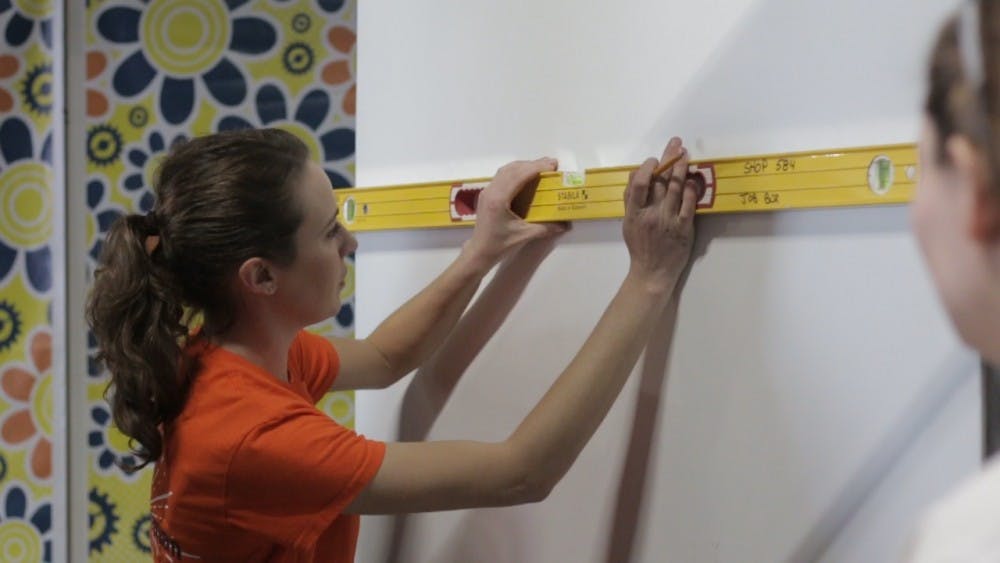When the words “women’s work” appear together, the brain makes an instant connection to domestic housewivery. No matter how feminist and progressive a person claims to be, much of Western society has historically trained its citizens to make that correlation, at least at first.
Changing the world’s understanding of work considered suitable for women is a big task — one activists and theorists have been tackling for years. From Simone de Beauvoir’s critique of women’s relegation to the home in her book “The Second Sex” to the laptop stickers reading “A woman’s place is in the House and Senate” which can be seen on the computers of many University students today, it’s clear the fight to normalize women working outside of the home is widespread.
Here in Charlottesville, the fight was made clear at IX Art Park Feb. 24, where women from University Facilities Management and the University Facilities Management Apprenticeship Program hosted an introductory workshop to introduce women 16 years of age and older to the skilled trades of carpentry, masonry, plumbing and electrical work. The big selling point of this particular event? No boys allowed.
Of course, both men and women are allowed to apply into Apprenticeship Program, a four-year curriculum within Facilities Management that is designed to give hands-on experience, classroom instruction and technical education in the trades. But the Queens of DIY Toolbox Workshop was an intentional effort to recruit female applicants and generally empower women with the do-it-yourself construction knowledge often considered to be exclusively for men.
Catering the event to women proved effective. The small garage-space was packed with about 50 women, and the crowd buzzed excitedly over coffee, cider and donuts while they waited for the Tradeswomen to signal the start of the workshop. In the moments before the demonstrations began, one woman turned to another and expressed how glad she was an event like this was happening because she had always wanted to learn this kind of thing. The fact that this was exclusively for women is what drove her to register.
“It’s not led by men,” she said to her friend. “So there’ll be no mansplaining involved.”
Once safety glasses and cut-resistant gloves were distributed to the participants, the Tradeswomen took to a small stage to introduce themselves and the impetus behind the workshop. Anne Lassere, a carpenter at the University, put their motivation in plain terms. “Many men out there have learned how to be handy from their fathers,” she said. “We propose that women can learn from their mothers.” The statement was met with cheers and applause, and she added, “‘Tradesman’ is typical, but we’re tradeswomen.”
It’s clear that the typicality of the male tradesman is pervasive. “Women represent only 1.3 percent of the skilled trades in America,” Lassere said. She went on to describe people’s reactions to a female carpenter arriving on a job site, saying people are surprised “all the time” by her presence.
“It’s always a surprise,” she said. “‘Oh, you don’t look like a carpenter,’ I get that a lot. But I take it as a matter of pride, and I take it in stride.”
The two-hour long event flew by, with participants divided into groups and rotating between four stations dedicated respectively to plumbing, electrical work, masonry and carpentry. The overall vibe was conversational and encouraging, a welcoming introduction into a world that’s been roped off to women for so long.
The word “tradeswoman” is much more than just a descriptor for this group. It’s a symbol of unity and progress, boldly emblazoned on the back of the tee-shirts worn by the featured skilled-trade professionals. The name was adopted by women working in the trades at the University to create a sense of community and togetherness among women in such a male-dominated field.
“We have a great group together, and we want to welcome more women into the trades because it’s so much fun,” Lassere said. “And having these kinds of skills for your whole life? No one can ever take that away from you.”







